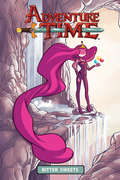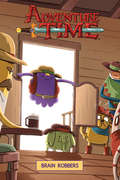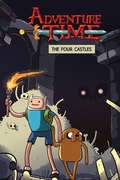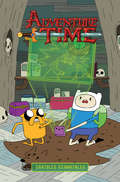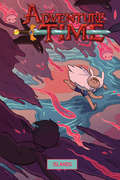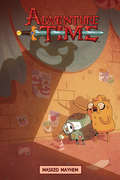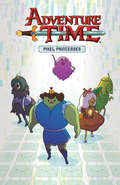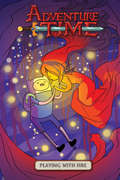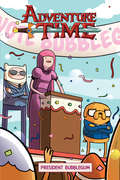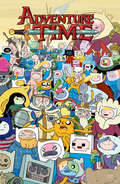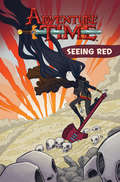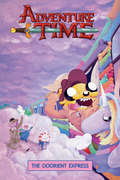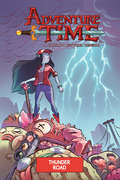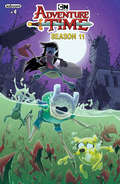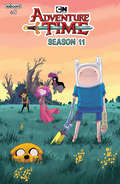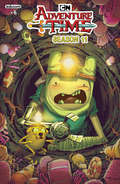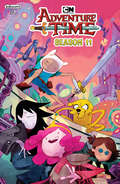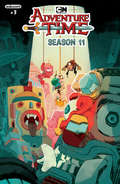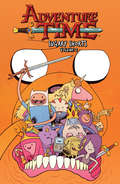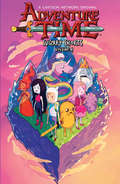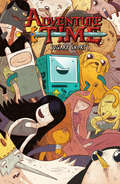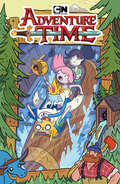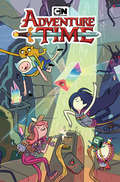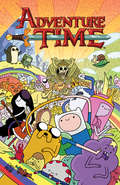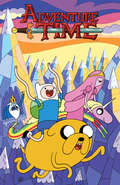- Table View
- List View
Adventure Time Original Graphic Novel: Bitter Sweets (Planet of the Apes #4)
by Pendleton Ward Kate Leth Zachary Sterling<p>It's that lovely time of year where Princess Bubblegum gets to leave the Candy Kingdom and venture out into the outer limits of Ooo. But when her annual quest to visit old friends takes a dark and unexpected turn, it's up to PB and Peppermint Butler to keep the peace by using the true power of friendship. <p>This is a fixed-format ebook, which preserves the design and layout of the original print book.</p> <P><P> <i>Advisory: Bookshare has learned that this book offers only partial accessibility. We have kept it in the collection because it is useful for some of our members. Benetech is actively working on projects to improve accessibility issues such as these.</i>
Adventure Time Original Graphic Novel: Brain Robbers (Planet of the Apes #9)
by Pendleton Ward Josh Trujillo Philip Murphy Zachary Sterling<p>In this new original graphic novel adventure from Josh Trujillo (Love Machines) and Zachary Sterling (Adventure Time), it's the most important moment of Lumpy Space Princess's life, and it's all going to slip through her fingers if she doesn't get help. Tree Trunks comes out of her mystery-filled retirement for one last job as she agrees to help LSP on a wild west treasure hunt. Finn and Jake secretly follow along to protect their friends but discover that LSP knows more than she is letting on about this particular treasure. <p>This is a fixed-format ebook, which preserves the design and layout of the original print book.</p> <P><P> <i>Advisory: Bookshare has learned that this book offers only partial accessibility. We have kept it in the collection because it is useful for some of our members. Benetech is actively working on projects to improve accessibility issues such as these.</i>
Adventure Time Original Graphic Novel: Four Castles (Planet of the Apes #7)
by Pendleton Ward Josh Trujillo Philip Murphy Zachary Sterling<p>Not everyone appreciates flash backs as much as the rest of us but when it comes to a throw-back reunion in the Lumpy Space Kingdom, LSP is definitely not ready. With help from a very unlikely source, LSP must face the past head on! <p>This is a fixed-format ebook, which preserves the design and layout of the original print book.</p> <P><P> <i>Advisory: Bookshare has learned that this book offers only partial accessibility. We have kept it in the collection because it is useful for some of our members. Benetech is actively working on projects to improve accessibility issues such as these.</i>
Adventure Time Original Graphic Novel: Graybles, Schmaybles (Planet of the Apes #5)
by Pendleton Ward Danielle Corsetto Bridget Underwood<p>Finn and Jake are about to go on their craziest series of adventures yet...and they don't even have to leave their living room? After helping Party God with his technical issues, these two best pals discover a tiny cube all by its lonesome in the middle of the woods. Not ones to leave the helpless so...helpless, Finn and Jake take their new friend back to the treehouse and discover that some of the most harmless looking things can be the most dangerous. <p>This is a fixed-format ebook, which preserves the design and layout of the original print book.</p> <P><P> <i>Advisory: Bookshare has learned that this book offers only partial accessibility. We have kept it in the collection because it is useful for some of our members. Benetech is actively working on projects to improve accessibility issues such as these.</i>
Adventure Time Original Graphic Novel: Islands (Planet of the Apes)
by Pendleton Ward Ashly Burch Diigii DagunaTies into the huge Adventure Time: Islands television event, the mini-series airing on Cartoon Network this winter where Finn meets other humans and an important member of his family for the first time. Written by Islands show writer Ashly Burch, this story serves as a prequel to the television event. In the wake of the mushroom war and the vampire infestation, the remaining humans of Ooo have set sail for safer shores. Bunny Girl (aka Jo), who was Marceline's precocious young friend from the "Stakes" mini-series, is fearful of what dangers await them. Two <p>Bread Tom, her caretaker in Marcy's absence, does his best to assuage her concerns. But after an attack from a swarm of monstrous sea creatures almost sinks the ship, Jo and the rest of the humans start to fear that it may not be safe anywhere. Luckily, they soon reach a plentiful island populated by another gregarious group of humans and attempt to build a new colony. The humans from Ooo are delighted and finally allow themselves to relax, all except for Jo, whose paranoia is as potent as ever. Her fears are confirmed when a swarm of enormous falcons descend on the settlement and snatch Jo up for dinner. Separated from her tribe, she must brave the dangers of the wild to get back to Two Bread Tom and the rest of the humans, and maybe learn a sense of self-reliance along the way. <p>This is a fixed-format ebook, which preserves the design and layout of the original print book.</p> <P><P> <i>Advisory: Bookshare has learned that this book offers only partial accessibility. We have kept it in the collection because it is useful for some of our members. Benetech is actively working on projects to improve accessibility issues such as these.</i>
Adventure Time Original Graphic Novel: Masked Mayhem (Planet of the Apes #6)
by Pendleton Ward Kate Leth Bridget Underwood<p>In this sixth Adventure Time original graphic novel, BMO and Jake are getting ready for the biggest costume party ever- they've received invites from everyone! As they party-hop, they realize that each party has one thing in common: a prankster. Detective BMO is on the case with the help of Jake, his sidekick, to figure out what's going on. Join them as they travel all across Ooo to find who the culprit is, while still enjoying some fun times with friends. <p>This is a fixed-format ebook, which preserves the design and layout of the original print book.</p> <P><P> <i>Advisory: Bookshare has learned that this book offers only partial accessibility. We have kept it in the collection because it is useful for some of our members. Benetech is actively working on projects to improve accessibility issues such as these.</i>
Adventure Time Original Graphic Novel: Pixel Princesses (Planet of the Apes #2)
by Pendleton Ward Danielle Corsetto Zachary Sterling<p>AN ALL-NEW ADVENTURE TIME ORIGINAL GRAPHIC NOVEL! Princess gatherings aren't always tea parties and doilies, there is a lot more to being a Princess that one might think. Danielle Corsetto (GIRLS WITH SLINGSHOTS) and Zack Sterling return with an adventure where some of our favorite princesses learn what it really takes to be a princess, while learning to respect each other for their unique outlooks on life. <p>This is a fixed-format ebook, which preserves the design and layout of the original print book.</p> <P><P> <i>Advisory: Bookshare has learned that this book offers only partial accessibility. We have kept it in the collection because it is useful for some of our members. Benetech is actively working on projects to improve accessibility issues such as these.</i>
Adventure Time Original Graphic Novel: Playing With Fire (Planet of the Apes #1)
by Pendleton Ward Danielle Corsetto Zachary Sterling<p>AN ALL-NEW ADVENTURE TIME ORIGINAL GRAPHIC NOVEL! Join Flame Princess, alongside Finn and Jake, as she leaves the Flame Kingdom and goes on her very first adventure! Written by acclaimed cartoonist Danielle Corsetto (GIRLS WITH SLINGSHOTS) and drawn by rising star Zack Sterling (BRAVEST WARRIORS, ADVENTURE TIME). A black and white edition appealing to fans of SCOTT PILGRIM and Japanese manga! <p>This is a fixed-format ebook, which preserves the design and layout of the original print book.</p> <P><P> <i>Advisory: Bookshare has learned that this book offers only partial accessibility. We have kept it in the collection because it is useful for some of our members. Benetech is actively working on projects to improve accessibility issues such as these.</i>
Adventure Time Original Graphic Novel: President Bubblegum (Planet of the Apes #8)
by Pendleton Ward Josh Trujillo Philip Murphy<p>The King of Ooo approaches the Candy Castle and proclaims that he has discovered the long-lost ConstitOootion. When Candy Law Professor verifies the authenticity of the document, which states in one week there will be an election for Ooo's first President, Princess Bubblegum will have to race against her enemies...and frenemies, to ensure her spot on the throne! <p>This is a fixed-format ebook, which preserves the design and layout of the original print book.</p>
Adventure Time Original Graphic Novel: Princess and Princess (Planet of the Apes #11)
by Pendleton Ward<p>When Finn is asked to kingdom-sit for Rock Princess, he’s excited to take a break from his usual responsibilities. That is, until the underground kingdom turns to him with pressing matters in need of deliberation. Now charged with “princess” duties, Finn is overwhelmed by his new job. Especially if it means war against...Princess Bubblegum! <p>This is a fixed-format ebook, which preserves the design and layout of the original print book.</p> <P><P> <i>Advisory: Bookshare has learned that this book offers only partial accessibility. We have kept it in the collection because it is useful for some of our members. Benetech is actively working on projects to improve accessibility issues such as these.</i>
Adventure Time Original Graphic Novel: Seeing Red (Planet of the Apes #3)
by Pendleton Ward Kate Leth Zachary Sterling<p>An original graphic novel starring Marceline the Vampire Queen! <p>This is a fixed-format ebook, which preserves the design and layout of the original print book.</p> <P><P> <i>Advisory: Bookshare has learned that this book offers only partial accessibility. We have kept it in the collection because it is useful for some of our members. Benetech is actively working on projects to improve accessibility issues such as these.</i>
Adventure Time Original Graphic Novel: The Ooorient Express (Planet of the Apes #10)
by Pendleton Ward Zachary Sterling Jeremy Sorese<p>Candy, suspicious conductors, and weird science make up this all-new Adventure Time original graphic novel written by Jeremy Sorese (Curveball, Steven Universe) and illustrated by Adventure Time veteran Zachary Sterling. Don't miss out on this action-packed journey based on the award-winning show on Cartoon Network! Lady Rainicorn has come down with a case of taffy fever and there is nothing Jake can do to help her. After many failed attempts with Princess Bubblegum, Finn and Jake learn of a special cure that can help Lady Rainicorn get back to normal. The catch? They will have to travel on the Ooorient Express on an infamous train ride that no one returns from... <p>This is a fixed-format ebook, which preserves the design and layout of the original print book.</p> <P><P> <i>Advisory: Bookshare has learned that this book offers only partial accessibility. We have kept it in the collection because it is useful for some of our members. Benetech is actively working on projects to improve accessibility issues such as these.</i>
Adventure Time Original Graphic Novel: Thunder Road (Planet of the Apes #12)
by Pendleton Ward Zachary Sterling Jeremy Sorese<p>Marceline starts feeling restless and comes across a motorcycle gang of storm clouds. Marceline sets off on the open road with her new friends but things take a turn when she realizes that the storm clouds might be taking things a bit too far when it comes to their pranks. Luckily, the answer comes from an unexpected source who just happened to be trailing the clouds… for research, of course. <p>This is a fixed-format ebook, which preserves the design and layout of the original print book.</p> <P><P> <i>Advisory: Bookshare has learned that this book offers only partial accessibility. We have kept it in the collection because it is useful for some of our members. Benetech is actively working on projects to improve accessibility issues such as these.</i>
Adventure Time Season 11 #4 (Adventure Time Season 11 #4)
by Ted Anderson Marina Julia Meg Casey Sonny LiewWhen Marceline loses her memories, everyone suspects foul play! Finn, Jake, Princess Bubblegum, and Simon must band together to save their friend!
Adventure Time Season 11 #5 (Adventure Time Season 11 #5)
by Ted Anderson Marina Julia Meg Casey Sonny LiewWhen Finn and Jake are finally ready to find a new home after their treehouse was destroyed during Golb’s attack, an unlikely group makes shore on Ooo, leading Finn to confront the question of where he truly belongs.
Adventure Time Season 11 #6 (Adventure Time Season 11 #6)
by Ted Anderson Sonny LiewAs Finn and Jake deal with the unlikely group that comes to Ooo’s shores, Finn gets put in a delicate position when Princess Bubblegum gets involved.
Adventure Time Season 11 (Adventure Time Season 11 #1)
by Ted Anderson Marina Julia Meg Casey Sonny Liew<p>Cartoon Network’s award-winning animated series Adventure Time will conclude this fall with Season 10—but this October, KaBOOM! proudly continues telling the stories of Finn and Jake in a new Season 11 comic series! In the aftermath of The Great Gum War, Finn, Jake and the entire land of Ooo begin to pick up the pieces with some new and unexpected friends. Written by Eisner Award-winning writer Sonny Liew (The Art of Charlie Hock Chye) and illustrated by Marina Julia (Lumberjanes: Faire and Square), this is the only place fans can get new stories in the land of Ooo! <p>This is a fixed-format ebook, which preserves the design and layout of the original print book.</p>
Adventure Time Season 11 (Adventure Time Season 11 #3)
by Ted Anderson Marina Julia Meg Casey Sonny LiewFinn and Jake learn that there is a reason that the three henchmen are so determined to find “precious” objects for Marceline, and it’s not anything good. Hunson Abadeer makes a show!
Adventure Time Sugary Shorts (Peanuts #2)
by Pendleton Ward<p>Collecting stories by amazing creators from around the world, Sugary Shorts Volume Two stars all your favorite characters from Marceline the Vampire Queen to Cinnamon Bun. This collection contains so much sugary goodness it's almost too sweet to handle. Featuring the work of Dustin Nguyen, Noelle Stevenson, Roger Langridge, Frazer Irving, and more! <p>This is a fixed-format ebook, which preserves the design and layout of the original print book.</p>
Adventure Time Sugary Shorts (Planet of the Apes #4)
by Pendleton Ward<p>Collecting stories by comic creators from around the world, Sugary Shorts stars all your favorite Adventure Time characters, from Fionna the Human to Billy the Hero. Includes fantastical tales from Kat Leyh (Lumberjanes), Jake Wyatt (Ms. Marvel), Michael Dialynas (The Woods), Kel McDonald (Misfits of Avalon), and more. <p>This is a fixed-format ebook, which preserves the design and layout of the original print book.</p>
Adventure Time Sugary Shorts: Sugary Shorts (Peanuts #1)
by Pendleton Ward<p>Comic creators from around the world unite to celebrate all things ADVENTURE TIME in this collection of incredibly original mini-adventures. Starring all of your favorite characters from Finn and Jake to Hot Dog Princess and Peppermint Butler, SUGARY SHORTS Volume One is a syrupy salute to the Land of Ooo that is sure to satisfy your sweet tooth. <p>This is a fixed-format ebook, which preserves the design and layout of the original print book.</p>
Adventure Time Vol. 16 (Adventure Time #16)
by Kevin Cannon Joey McCormick Maarta LaihoIt’s double trouble throughout all of Ooo! When Finn and Jake discover an Adventure-themed Theme Park, our favorite adventurers get more than they bargained for when visiting the Wish Witch. Now stuck with an ever-growing amount of doubles, Finn and Jake set off to reverse the spell before the doubles overrun the Candy Kingdom. Collects issues #70-73
Adventure Time Vol. 17 (Adventure Time #17)
by Ryan North Mariko Tamaki Christopher Hastings Conor McCreery Pendleton Ward Kiernan Sjursen-LienAfter six years and 75 issues, Finn, Jake, and your favorite characters from Cartoon Network’s Adventure Time star in their final collection from the ongoing series. Together, they’ll face off against Magic Man stealing the colors from Ooo and take on one of their most challenging quests of all: a royal wedding... And there’s even a special adventure starring Fionna & Cake as they retrieve the punch for Prince Gumball’s semi-annual Punch Parade! Featuring a tour-de-force of creators from across Adventure Time history—including writers Ryan North (The Unbeatable Squirrel Girl), Mariko Tamaki (This One Summer), and Christopher Hastings (The Unbelievable Gwenpool), along with artists Shelli Paroline & Braden Lamb (Making Scents), Ian McGinty (Invader Zim), and Zachary Sterling (Bee & Puppycat)—this final journey through Ooo is a must-have for every fan.
Adventure Time Volume 1 (Planet of the Apes #1 - 4)
by Pendleton Ward<p>The totally algebraic adventures of Finn and Jake have come to the comic book page! The Lich, a super-lame, SUPER-SCARY skeleton dude, has returned to the the Land of Ooo, and he's bent on total destruction! Luckily, Finn and Jake are on the case...but can they succeed against their most destructive foe yet? Featuring fan-favorite characters Marceline the Vampire Queen, Princess Bubblegum, Lumpy Space Princess and the Ice King! Collecting issues 1-4 of the smash hit ADVENTURE TIME comics series by Ryan North, Shelli Paroline and Braden Lamb! <p>This is a fixed-format ebook, which preserves the design and layout of the original print book.</p>
Adventure Time Volume 10 (Planet of the Apes #45 - 49)
by Pendleton Ward<p>Josh leaves Finn and Jake a message to navigate a secret cave to find an artifact but hey, one of the walls caved in, so they don't have to listen to all of it! Then again, there might have been some important info on that recording. Join Finn and Jake as they take on...a new sister?! It's memories versus curses as our two best pals do what they do best: break statues and cause a ruckus. Collects issues 45-49. <p>This is a fixed-format ebook, which preserves the design and layout of the original print book.</p>
